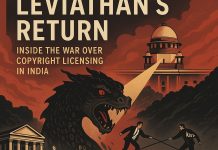In a rather detailed judgment dated May 28th, 2018, a Division Bench of the Delhi High Court has upheld the constitutionality of certain provisions of the Copyright Rules, 2013 in the matter of Anand Bhushan & Ors. v. Union of India.
To give a brief background: In 2013, a writ petition was filed in the Delhi High Court by Mr. Anand Bhushan of M/s Pitambar Publishing Co. Pvt. Ltd. challenging certain provisions of the Copyright Act, 1957, as amended by the Copyright Amendment Act, 2012 (“Act”) and Copyright Rules, 2013, as being violative of Articles 14 and 19 of the Constitution of India. The scope of the constitutional challenge was eventually narrowed down to Rules 56(3), 56(4), 56(5), 56(6), 57(5), and Rule 61(5) of the Copyright Rules, as the matter progressed.
Section 78 of the Copyright Act, 1957 empowers the Central Government to make rules for carrying out the purpose of the Act. In exercise of this power conferred on it by the Act, the Central Government enacted the Copyright Rules, 2013. Rule 56 lays down the manner in which copyright societies shall frame their tariff scheme, Rule 57 lays down the manner in which an appeal in respect of a tariff scheme can be made before the Copyright Board and Rule 61(5) states that every member of the copyright society shall have equal voting rights in General Body meetings.
In respect of the challenges to Rules 56(3), 56(4), 56(5) & 56(6) (“said Rules”), the Petitioners submitted that where the Amendment Act 2012 under Section 33A gives the Copyright Board a limited corrective or provisional power in respect of the tariffs of Copyright Societies; the said Rules effectively confer upon the Copyright Board roving powers to regulate and interfere suo moto with every aspect of the tariff fixation. They further submitted that the Copyright Society is wholly competent to fix its own tariff under Section 35 of the Act.
The Respondent submitted that Section 33A of the Act which provides for a tariff scheme for Copyright Societies; introduces a system of transparency in respect of fixation, collection and distribution of royalty by such societies. The objective of this proposal is to allow scrutiny of tariff scheme of Copyright Societies by the Copyright Board on receipt of appeals from any aggrieved party to make the user of works to continue to pay royalties, pending the appeal before the Copyright Board. They further submitted that the Copyright Board does not take away the right of the right holders to fix royalties, but merely removes any unreasonable element, anomaly or inconsistency therein.
The Petitioners urged that the said Rules are in conflict with the statutory mandate of Section 33A of the Act and violate the same.
After a careful consideration of the relevant provisions under the Act and the Copyright Rules, 2013 as well as the precedents relied upon by the Parties, the Court observed that the object and purpose behind sub-section (2) of Section 33A of the Act was to confer power upon the Copyright Board to make enquiry as may be necessary and to decide whether the tariff fixed by the Copyright Society has an ‘unreasonable element’, ‘anomaly’ or ‘inconsistency’ therein and held that it would not like to curtail or water down the scope and ambit of language employed and adopted, given the importance to the Copyright Board for the said purpose. The expression “unreasonable element”, would have to be interpreted and examined by the Copyright Board in facts of the given case.
With respect to Rules 56(3), 56(4), 56(5) & 56(6), the Court was of the opinion that the said Rules do not in any way run counter to or defeat the right of the Copyright Society to fix and claim reasonable tariff; but merely ensure that the copyright societies publish tariff schemes that have some form of uniformity and consistency for the users to be able to understand and appreciate them. The Court observed that, “We are of the opinion that the Rules do not negate the principal enactment and it cannot be said that they are repugnant to or in derogation of the object and purpose, the principal enactment seeks to achieve.”
The Court dismissed the writ petition and concluded by stating, “Impugned Rules do not bring into existence or create substantive rights or obligation not contemplated and beyond what is envisaged and postulated by the provisions of the Act itself.”
Image Source: Here



















